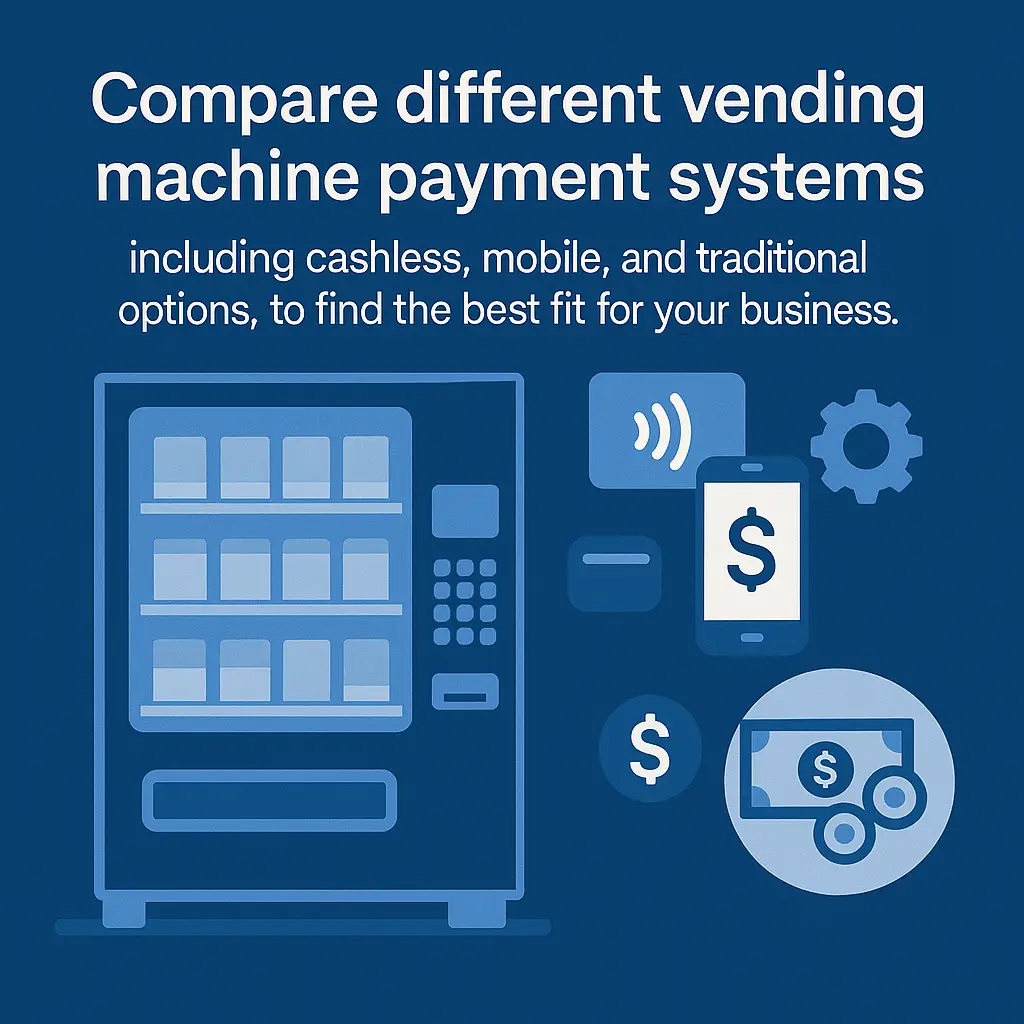Payment System Options for Vending Machines
Compare different vending machine payment systems, including cashless, mobile, and traditional options, to find the best fit for your business.
Back to Vending Info for Businesses ResourcesCompare different vending machine payment systems, including cashless, mobile, and traditional options, to find the best fit for your business.
Back to Vending Info for Businesses ResourcesModern vending machines offer a variety of payment methods, from classic cash to advanced cashless solutions. Selecting the ideal system can significantly impact customer satisfaction and operational efficiency.
![]() Integrate cashless payment for increased sales and convenience
Integrate cashless payment for increased sales and convenience
![]() Explore mobile payment options for a seamless user experience
Explore mobile payment options for a seamless user experience
![]() Balance traditional cash with modern solutions for broad appeal
Balance traditional cash with modern solutions for broad appeal

The evolution of vending machines has been driven by technological advancements, and payment systems are at the forefront of this change. Gone are the days when a machine only accepted exact change. Today, a multitude of options exist to enhance user experience, boost sales, and streamline operations. Understanding these options is crucial for any business looking to maximize its vending potential.
While modern solutions gain popularity, cash and coin payment systems remain a foundational component of many vending operations. They offer universal accessibility, often serving demographics who may not use cards or mobile wallets. Features like bill validators and coin mechanisms allow for precise transactions, though they require regular collection and maintenance to prevent jams.
Cashless vending has become increasingly dominant, reflecting consumer preferences for speed and convenience. These systems typically integrate credit and debit card readers, allowing customers to pay with a swipe, tap, or insert. The benefits extend beyond convenience, including reduced cash handling risks and improved sales data collection. For many users, the primary question is often, "How does cashless vending work?" which is crucial in understanding its security and efficiency.
Mobile payment options, such as Apple Pay, Google Pay, and other NFC-enabled wallets, are rapidly gaining traction. These contactless methods offer unparalleled speed and hygiene, making them particularly attractive in high-traffic or public environments. Their adoption is driven by the widespread use of smartphones and a desire for touchless transactions. These systems do, however, require robust connectivity; for more details on this, you might explore whether vending machines need WiFi.
Some businesses, especially in corporate or educational settings, opt for proprietary or closed-loop payment systems. These can involve employee ID cards, pre-loaded keys, or custom mobile apps. They often allow for subsidies, loyalty programs, or controlled access, providing an additional layer of customization and benefit for the intended user group. Such systems are tailored to specific environments and allow for granular control over product access and pricing. Understanding various payment technologies is just one aspect; companies should also delve into how telemetry in vending machines can further optimize their operations by providing real-time data.
Choosing the right payment system involves considering your target audience, the location of the machines, and your operational goals. A hybrid approach, offering both traditional and modern options, often provides the best balance of accessibility and advanced functionality.
The main options include traditional cash and coin, cashless (credit/debit card, mobile pay), and closed-loop systems like employee cards.
Cashless vending increases sales, reduces the need for cash handling, offers better sales data, and provides convenience for users.
Yes, many modern vending machines are equipped with readers that support popular mobile payment methods for added user convenience.
Cash and coin systems are universally understood, accessible to everyone, and don't require internet connectivity for transactions.
Yes, cashless and mobile payment systems typically require a reliable internet connection (Wi-Fi or cellular) to process transactions in real-time.
Modern cashless systems can often process refunds virtually, either immediately to the card or through a customer support process.
Cashless systems use encryption and secure processing to protect card and mobile payment data, complying with industry standards.
Yes, many machines are equipped with hybrid payment systems that accept both cash/coin and cashless methods simultaneously.
The choice depends on the target audience, location, expected sales volume, and the desire for advanced data and reduced cash handling.
Cashless systems generally reduce maintenance associated with coin jams and bill validators, shifting focus to software updates and connectivity.